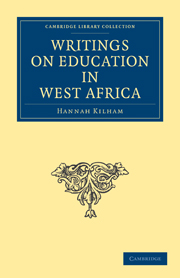THE CLAIMS OF WEST AFRICA TO Christian Instruction, THROUGH THE NATIVE LANGUAGES
Published online by Cambridge University Press: 07 September 2011
Summary
THE CLAIMS OF WEST AFRICA, &c.
The colony of Sierra Leone, interesting and important as it is, when regarded as a station inhabited by Africans from more than thirty different tribes, has not yet, it must be allowed, exhibited all those encouraging marks of advancement, either in civil or religious knowledge, which have been anxiously desired, and which indeed are still hoped for by many who look to this colony as a point from which, through the favour of Divine Goodness, may one day be extended the blessings of civilization and Christian instruction to many nations on the wide and almost unexplored continent of Africa.
This station having been formed and maintained on a principle of benevolent concern for the good of Africa, and as a place of reception for the unhappy victims of cruelty and oppression, when rescued from the slave-ships, presents a very peculiar and a very powerful claim to our interest and regard; and the enquiry ought to be fairly met as to what really is its present state, and what the impediments to its more rapid advancement.
If from feelings of individual compassion a Christian philanthropist had rescued from the hold of a slave-ship one helpless child, and placed it under care for shelter and instruction, would he not feel so much interest for his rescued charge, as fully to inform himself from time to time how the child was cared for and instructed?—whether its physical wants as to food, shelter, and medical care were suitably provided for, and its mind receiving the advantages of appropriate instruction and judicious Christian care?
- Type
- Chapter
- Information
- Writings on Education in West Africa , pp. 25 - 54Publisher: Cambridge University PressPrint publication year: 2010First published in: 1828

